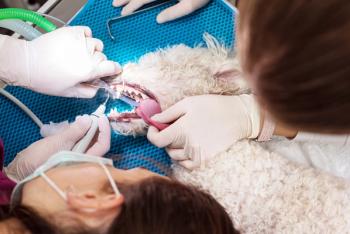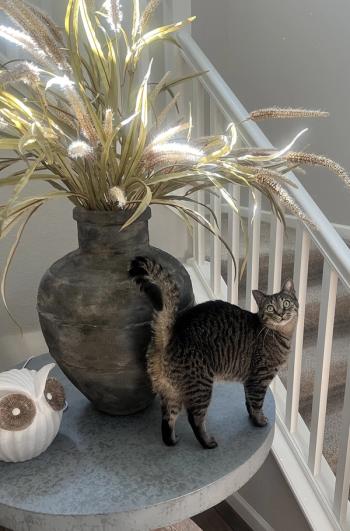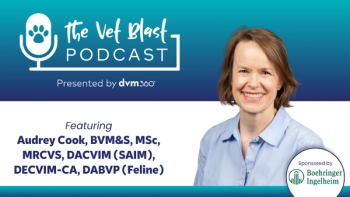
Bylaws cleanup sweeps leadership meeting
Chicago — If framers of a revision to the American Veterinary Medical Association's (AVMA) governing documents have their way, future presidential races, should they be tied, could come down to a "game of chance."
CHICAGO — If framers of a revision to the American Veterinary Medical Association's (AVMA) governing documents have their way, future presidential races, should they be tied, could come down to a "game of chance."
So close, yet still far off: After almost four years of wrangling on a comprehensive rewrite of the American Veterinary Medical Association's bylaws, proponent Dr. Charles Stoltenow encounters criticisms from the House of Delegates. "The bylaws reflect reality," he says during the AVMA Veterinary Leadership Conference and House of Delegates Informational Assembly in Chicago. "Our two bodies can work in concert and not have conflict," he contends.
While that might sound farfetched, language for an equal probability verdict made its way into the third draft of the House Advisory Committee's (HAC) delegate manual. The proposal topped a long list of changes pitched last month during the AVMA's leadership meeting in Chicago. Former HAC Chairman Dr. Charlie Stoltenow presented the Executive Board/House Advisory Committee Constitution and Bylaws Review Task Force's latest plans to revamp AVMA's governing documents to an audience of cautious House of Delegates (HOD) members.
"You can use something like a flip of a coin, but if there are more than two candidates, there will have to be some other means of determining the winner," says Stoltenow, a candidate for AVMA president-elect running this summer in a contested race. "It's only a proposal though."
Current AVMA rules deem the organization's president the voting tiebreaker.
'Huge fundamental shift'
While some delegates scoffed at the equal probability suggestion, many were put off by a re-emerging power struggle between the House and AVMA's Executive Board. In a move to combine AVMA's current constitution and bylaws, the seventh and latest revision of the proposed new ruling accord outlines roles for both governing bodies, granting the House broad policy-making power and the Executive Board fiduciary as well as policy-making capabilities, which didn't previously exist in writing. Delegates likely will vote on a final version of the bylaws and House manual during the group's annual meeting in July.
AVMA legal consultant Jed Mandel deems consolidating to form a new bylaws document "prudent" to eliminate overlaps and contradictions. He admits the association doesn't need a House to run its operations, but notes its history supports delegates' continued role. "The House has the ability to influence the Executive Board," he says.
Change isn't easy: Executive Board member Dr. David McCrystal details a proposed bylaws revision to a group of seemingly wary delegates. "This is not the Executive Board cramming this down your throat," he says.
But some delegates suggest that's not enough. While House members can pass resolutions reversing Board decisions, the Board meets more frequently, offering it increased ability to go against House mandates. The checks and balances system is off kilter, critics say.
"Let's have the real discussion: Does the House of Delegates have a future? That's the level we're at in disguise," says Dr. Merry Crimi, delegate for the American Animal Hospital Association. "This is a huge fundamental shift. Let's be sure everyone understands that."
Call to meet more
Additional tension accompanied the revision's suggestion to strip responsibility to set dues from the House and place it with the Executive Board. Challenged by critics, Executive Board member Dr. David McCrystal defended the proposal by classifying it as a "fiduciary responsibility." The bottom line is "where does the authority rest?" he asks. "You don't need the House of Delegates to run this corporation. What you're seeing is a compromise."
To even the authority score, some delegates suggested meeting more as a formal governing body with the ability to pass policies at least twice a year instead of annually. The drawback, leaders say, is that delegates would lose the benefit of having casual discussions by turning the unofficial leadership meeting in Chicago into a formal delegates session. Still, HAC member Dr. Mark Helfat asks "Why isn't the House just as powerful" as the Executive Board? "We could easily have two formal meetings a year."
No buybacks
The revision also omits the ability for aspirant leadership candidates to buy back years they were not AVMA members in order to run for office. Stoltenow's candidacy for 2006-2007 president-elect reportedly was permissible following an unprecedented move by AVMA's Judicial Council that allowed the North Dakota State University extension veterinarian to pay up on his lapsed AVMA dues. Allowing veterinarians to settle dues for non-member years is a practice previously reserved for honor roll candidates so they can meet AVMA's 10-year membership threshold.
"So we're going to have one person who got away with that and (now) no one else can?" asks Dr. Lisa Miller, a alternate delegate from Virginia.
Also mandated by the revision is a three-year termination period for all committees unless renewed by the Executive Board. That includes the Animal Welfare Committee, which narrowly hung on via outcries of support after AVMA attempted to scrap it in favor of creating new groups within its Division of Animal Welfare, developed in 2004.
Veto power
Granting new power to the House is language in the draft manual that provides delegates a mechanism to block resolutions for consideration with a two-thirds majority vote. While critics contend the move "smacks of the old boys club" at AVMA, Dr. Gregg Cutler, alternative delegate from the American Association of Avian Pathologists, says, "It protects the AVMA from things meant to embarrass them," such as resolutions sponsored by activist initiatives. Offering a middle ground, delegates suggested increasing the majority vote to a unanimous decision.
Changes also are suggested to discourage last-minute resolutions from being introduced on the House floor. "We don't want to ambush the House," McCrystal says.
Newsletter
From exam room tips to practice management insights, get trusted veterinary news delivered straight to your inbox—subscribe to dvm360.




